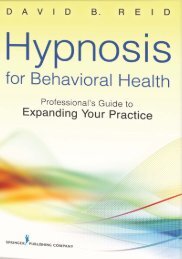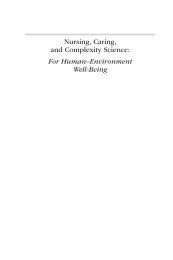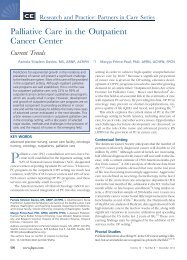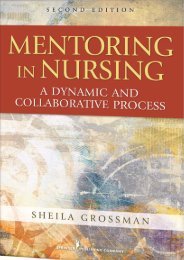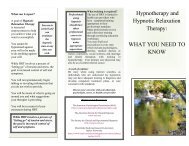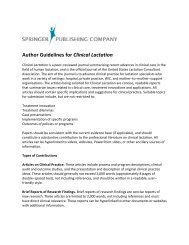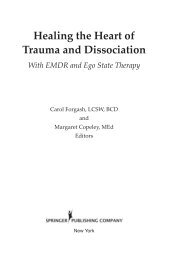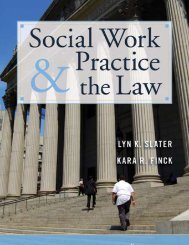Expertise in nursing practice : caring, clinical judgment - Springer ...
Expertise in nursing practice : caring, clinical judgment - Springer ...
Expertise in nursing practice : caring, clinical judgment - Springer ...
You also want an ePaper? Increase the reach of your titles
YUMPU automatically turns print PDFs into web optimized ePapers that Google loves.
18 <strong>Expertise</strong> <strong>in</strong> Nurs<strong>in</strong>g Practice<br />
reasoned observation of one’s <strong>in</strong>tuitive, <strong>practice</strong>-based behavior with an<br />
eye tochalleng<strong>in</strong>g, and perhaps improv<strong>in</strong>g, <strong>in</strong>tuition without replac<strong>in</strong>g it<br />
by the purely theory-based action of the novice, advanced beg<strong>in</strong>ner, or<br />
competent performer.<br />
Another exampleofwhere theory <strong>in</strong>teracts with <strong>practice</strong> occurs when<br />
an expert <strong>in</strong>tuitively feels that a situationisso novelasto preclude <strong>in</strong>tuitive<br />
response. The first reaction of the expert will be to seek the advice of<br />
someoneforwhomthecurrent situationisnotnovel, due to their differ<strong>in</strong>g<br />
experiences. If that is impossible, recogniz<strong>in</strong>g <strong>in</strong>tuitively the need for<br />
theory, the expert will try to recall the rules and scientific knowledge<br />
he learned asabeg<strong>in</strong>ner <strong>in</strong>order tocope with the novel situation. Not<br />
only novelmedical conditions can elicit competent,calculatedbehavior,<br />
but they can also cause changes <strong>in</strong>the work<strong>in</strong>g environment. If a nurse<br />
has been assigned to anew ward or transferred to anew hospital with a<br />
different work<strong>in</strong>g culture, it might be bettertocalculateout a competent<br />
response to a familiar situation than to <strong>in</strong>tuitively respond <strong>in</strong> a way that<br />
was considered expert under previous circumstances.<br />
We have seennowhowtheory <strong>in</strong>teracts with <strong>practice</strong> <strong>in</strong> surpris<strong>in</strong>gly<br />
<strong>in</strong>terest<strong>in</strong>g and important ways. Anyone see<strong>in</strong>g skill as merely theoretical<br />
knowledgeorasonly <strong>practice</strong>dresponse will miss much of this <strong>in</strong>trigu<strong>in</strong>g<br />
picture. The very rules and pr<strong>in</strong>ciples so highly valued bythe theoretician<br />
almost always, when closely exam<strong>in</strong>ed, are seen to require fortheir<br />
application facts and features, some ofwhich are recognized thanks to<br />
<strong>practice</strong> but undef<strong>in</strong>ed bytheory. Practice, on theother hand, would<br />
probably beoflittle avail were it notpreceded by tra<strong>in</strong><strong>in</strong>g concern<strong>in</strong>g the<br />
relevant features <strong>in</strong> various situations and some theoretical understand<strong>in</strong>g<br />
of relationships and correlations among these features. With these<br />
learned conceptual and theoretical ideas from whichto start, the learner<br />
can safely beg<strong>in</strong> to take responsibility and acquireexperience.More importantly,<br />
it is quite possibly the bra<strong>in</strong> <strong>in</strong>stantiation of this conceptual<br />
knowledge that experience will eventually override, as these rule-based<br />
proceduresare replacedbythe synaptic modifications that make possible<br />
an <strong>in</strong>tuitive response. Without theory as a start<strong>in</strong>g po<strong>in</strong>t, no twoobservers<br />
giventhe sameexperienceswould be likely to see th<strong>in</strong>gs <strong>in</strong> remotely similar<br />
ways. A new set of circumstances would likely be responded to by<br />
theseobservers <strong>in</strong> radically different ways rather than <strong>in</strong> theconsensually<br />
accepted way ev<strong>in</strong>ced by similarly tra<strong>in</strong>ed experts. Without consensual<br />
agreement concern<strong>in</strong>g good <strong>practice</strong>, no mean<strong>in</strong>gful after-the-fact discussion<br />
could occur, and little progress <strong>in</strong> improv<strong>in</strong>g theoverall skill level<br />
of the group could transpire.



